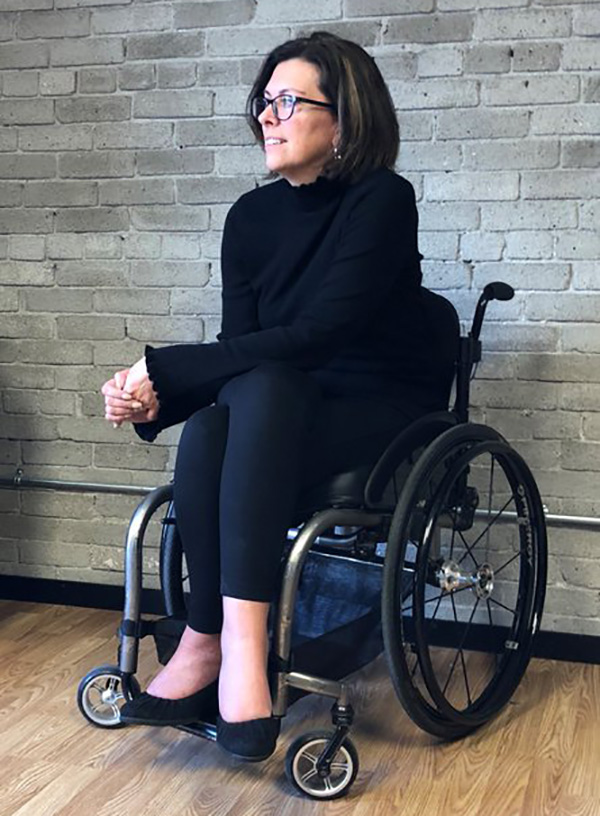MLA Stephanie Cadieux has mixed feelings about a British Columbia government bill aimed at improving accessibility for people with disabilities.
“I am happy that we’re moving legislation forward that will enable us to do the more detailed work,” said Cadieux, the MLA for Surrey South and the BC Liberal Party’s critic for gender equity, accessibility and inclusion.
“It’s a much-needed start, and I’m happy about that,” she said. “I’m disappointed that it doesn’t go deeper faster.”
Bill 6, the Accessible British Columbia Act, received its second reading last week and is expected to return for the more detailed committee stage debate soon.
The bill, Social Development and Poverty Reduction Minister Nicholas Simons said in the legislature, “allows us, as a society, to define with care and precision what we should expect of our government and other organizations when it comes to being accessible.”
“Specifically, it gives us a way of identifying barriers, removing barriers and preferably preventing them from being established in the first place.”
The bill defines a barrier as “anything that hinders the full and equal participation in society of a person with an impairment,” and notes it could be “caused by environments, attitudes, practices, policies, information, communications or technologies, and... affected by intersecting forms of discrimination.”
The bill also gives cabinet the power to identify, remove and prevent barriers. It allows for an advisory committee to be struck and for a director to be appointed who can assess fines for certain contraventions of the act.
Many of the key details are still to come, however, with the bill giving cabinet and the minister powers to set standards and enact regulations, rather than spelling out specifically what they should be.
Cadieux said that lack of detail is a significant weakness of the bill. “I was hoping they would have codified some things in the legislation and not left everything to regulation,” she said.
The bill has been a long time in the making, Cadieux said, noting that all the major parties made related commitments in the last two elections and that there’ve been two rounds of extensive consultation on it in recent years.
“As a person with a disability and as an advocate, it leaves me wondering if it will happen. It leaves me concerned that it’s not going to happen fast enough, that I’m not going to see the change in my life and for others that I want to see quickly enough.”

The bill is intended as “enabling” legislation, and Simons said its flexibility is a strength.
“The fact that we’ve got to a place where the foundation is in place, I think is positive,” he said. “It’s a solid framework, a solid foundation for the work that comes next, and I think the work that comes next is key to actual changes that will be visible, seen in the community, felt in the community.”
Andrew Robb, staff lawyer at the disability law clinic run by Disability Alliance BC, said it’s important to get the legislation right. But the alliance is concerned enough about its shortcomings that he’s calling on the government to pause the bill’s progress and consult with people it affects.
“If it works well, it will be extremely beneficial to an enormous number of people,” said Robb. “At this stage I think it’s worth taking more time to ensure we have the framework right.”
The alliance, with the support of several other organizations, has provided detailed feedback to MLAs in an eight-page review of the act.
The review includes concerns about the lack of timelines, the lack of clarity around what organizations the law will apply to, weak enforcement provisions and the failure to allow for a complaints process.
The organization also noted that unlike similar acts in other jurisdictions, B.C.’s fails to refer to human rights in general and B.C.’s human rights code in particular. Compared to federal legislation, the B.C. law narrows the definition of “impairment,” they said.
The B.C. bill’s “impairment” definition includes physical, sensory, mental, intellectual and cognitive impairments, whether permanent, temporary or episodic.
The alliance notes this excludes learning and communication-related impairments. “We are concerned this omission will systemically exclude and discriminate against British Columbians who have communication disabilities as well as those who have learning disabilities,” they wrote.
The act is a move in the right direction, but it’s worrying that so many of the key details will be in regulations instead of in the law itself, Robb said. “Regulations are a lot easier to change,” he said, noting that any advance would be vulnerable to a change in government.
The bill also lacks mechanisms that would allow people to hold the government to account, Robb said. Unlike other similar laws, it lacks timelines for creating regulations and eliminating barriers. And after the early years, independent reviews of how it’s working will only be made every 10 years.
Robb said that every other accessibility law clearly states that it doesn’t take away from any rights that already are recognized under existing human rights laws. He worries that over time the human rights of people with disabilities could be flattened down — that if an organization has complied with the new accessibility law it will be seen as enough.
In other jurisdictions, similar laws also clearly state that they apply to both the public and private sector, though generally the private sector gets more time to implement changes, Robb said. In B.C., where the government has said it will start with the public sector, it’s unclear if and when the law will be applied to the private sector.
“In this law that might happen, but it doesn’t say so in the law,” Robb said.
Coupled with the ability to make future decisions under the act behind closed doors, he said, the government leaves itself open to lobbying from private sector interests that may want to see standards delayed or weakened.
Minister Simons said he’s heard concerns from advocates, but the government has no plans to delay the legislation.
“I think people are going to find it a help,” he said. “It’s going to result in things being done better, basically. We just have to get it past the legislature first.”
Simons said he expects trust will build as the government continues with the detailed work after the bill passes, work that will further involve people with disabilities and their advocates following a “nothing about us without us” principle.
“I think once standards and regulations start to get shaped, people are going to be less concerned about the things people have raised in terms of timelines and such,” Simons said. “I get it, but I think we have a pretty good piece of legislation that’s been in the making for two years.”
The open-ended nature of the bill allows the government to be responsive to what it hears through that process, he said.
“I want to make sure we are propelled by the priorities of people in the disability community,” he said. “If we don’t know what area our first standards are going to be in — built environment, communication, transportation, I don’t want to even guess — how do we set a timeline on a process that we don’t even know the size of that particular process?”
Moreover, it will be a long-term process of identifying barriers and removing them, Simons said.
Improving accessibility is a priority for the government and introducing deadlines could be counterproductive, he said.
“We want the regulation and the standards to be good, we want them to be thorough,” he said. “If you put artificial deadlines on things, they can either make things rush or they can take up to the maximum amount of time. They don’t seem to be working in other jurisdictions.”
As for the lack of mention of human rights, the bill doesn’t affect matters already established under other legislation and drafters try to avoid the redundancy of repeating what’s already in place in other laws, he said.
Hopefully organizations will work proactively to meet the standards once they’re set, and if not, the bill does include mechanisms for enforcement, Simons said. “We have the ability to enforce. We have the ability to fine. We have the ability to double that to $500,000 if we need to.”
BC Liberal critic Cadieux said it’s great that the bill includes penalties, but it’s unlikely they’ll be used anytime soon. “We have a long way to go before there’s anybody that is subject to those potential penalties.”
Before Cadieux was first elected in 2009 she worked for what’s now Spinal Cord Injury BC and was on the board of Disability Alliance BC. This informs her questions about the legislation, she said.
For example, the bill says 50 per cent of the advisory committee will be people with disabilities or people who represent them.
“Theoretically, you could have no person with a disability on that committee,” Cadieux said. “You could have all able-bodied advocates or support people.”
There’s also disappointment that the government plans on striking another committee instead of simply enacting the specific standards that people with disabilities and their advocates have already over the past couple years told the government are needed, she said.
That makes it hard for many to trust that the government is serious about making the changes, she added.
Additionally, she said, while it makes sense in some ways for the law to be applied to the provincial government first, many people face barriers in their day-to-day lives in their municipalities, homes and workplaces outside the government.
“The reality is, I think people in the communities, people living their lives, are going to say, ‘Well nothing changed for me here, and how long is it going to be before this thing that irritates me on a daily basis is addressed?’”
Nearly 25 per cent of people have some form of disability, and barriers affect their friends and families as well as the individual, Cadieux said, giving the example of her parents limiting their choice of home to one she could visit using her wheelchair.
“It has so much more potential impact than I think most people recognize,” she added. “People with disabilities of all types are facing barriers every day that for a very long time now we have recognized in many cases as a larger government, and we still haven’t managed to get it right.”
Still, the bill is a move forward, Cadieux said. Despite what she described as its weaknesses, the opposition will support it and she doesn’t want to see it delayed.
Minister Simons said people can trust that the bill moves the province in the direction it needs to go.
“I think people will be pleased ultimately with the outcomes.” ![]()
Read more: Rights + Justice, BC Politics

















Tyee Commenting Guidelines
Comments that violate guidelines risk being deleted, and violations may result in a temporary or permanent user ban. Maintain the spirit of good conversation to stay in the discussion.
*Please note The Tyee is not a forum for spreading misinformation about COVID-19, denying its existence or minimizing its risk to public health.
Do:
Do not: